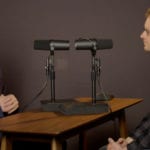“If the foundations are destroyed, what can the righteous do?” (Psalm 11:3)
I was reminded of the psalmist’s question as I read through Matthew Lee Anderson’s latest book, The End of Our Exploring: A Book About Questioning and the Confidence of Faith. David’s desperate question (and Matthew’s excellent book) has particular resonance for me. David’s question kept me seeking, kept me hoping, kept me pressing on during a dark season of doubt during my sophomore year of college. In the psalm, “the foundations” that David is referring to are most likely the wise and just rulers of Israel, those responsible for the well-being of God’s people. If the wicked destroy such leaders, what will the rest of Israel do? When the guardians are laid low, who will protect the people?
In my experience, the question hit closer to home. It was not the safety of foundational leaders that I was concerned for, but the authority and trustworthiness of the Scriptures, the foundation of my faith and the source of my knowledge of Jesus Christ. During my freshman year at Texas A&M, the Bible broke open to me in unprecedented and life-altering ways. I devoured sermons, articles, and books, and most of all, the Scriptures. During those days theological anchors such the doctrines of grace and the glory of the gospel were set. “Growing by leaps and bounds” is the phrase that always comes to my mind when I think about that year.
Unprepared for the Questions
In the fall of my sophomore year, I decided to develop this love for the Scriptures by taking a class on the Old Testament. In that class I was first exposed to higher criticism of the Bible, to the JEDP theory and other attempts to deconstruct the integrity of the Bible and treat it as just another ancient (and error-filled) collection of texts. Suffice it to say, I was ill-equipped to deal with such theories.
The questions came and kept on coming. Is the Bible true, trustworthy, and authoritative, or is it just another human and fallible expression of man’s religiosity? What if Christianity isn’t true? What if Jesus isn’t the way to God? What if Buddhism or Islam or atheism are actually true? If the Scriptures are up for grabs, how can I have any assurance about reality? And given the eternal stakes involved, how can I begin to sort through it all?
The question of the stakes involved really set me spinning. The reality of hell landed on me like a ton of bricks. I knew what the Bible taught: millions of people, including people I knew, would suffer for eternity for their rebellion against God. But now I was unsure whether it was true. The swirl of questions sent me into a tailspin: extreme anxiety, panic attacks, desperate tears followed by emotional numbness, an extended spiritual depression. In that context David’s question about destroyed foundations proved to be so meaningful to me. If the Scriptures are destroyed as my foundation, what am I supposed to do?
David’s question didn’t answer my questions. They remained as potent and incessant as ever. In fact, they had become more than mere questions; they were now deep and unsettling doubts. And as Anderson points out in his book, doubting and questioning aren’t the same thing:
Doubt seems to be more of a state or condition, while questioning is a pursuit. When we doubt, we hesitate over whether to welcome or accept what is before us. We waver in our stance and hold ourselves back from committing ourselves. The posture of doubt is even different from outright unbelief: it is neither the boldness of an outright rejection or the humility of belief. It is, instead, a vacillating double-mindedness that prevents us from living a fully integrated life within the world. It is to be tossed about by every wave and wind of the sea.
But David’s question was so helpful precisely because it didn’t try to answer my specific questions. I’d already chased (and caught) enough answers to know that I could always (and would always) come up with more questions. David’s question anchored me for the same reason that John Piper’s description of “self-extinction” in his biographical sketch of Charles Spurgeon did: It confirmed that I wasn’t alone, that I wasn’t the first to feel the despair of foundations melting beneath my feet. And in the absence of answers, that was enough to keep me going.
Christ Is the Answer
Psalm 11 confirmed for me that it wasn’t answers that I really needed. Instead, I needed to encounter the Answer, the One whose throne is in heaven, the Righteous One who tests the righteous so that they can stand before him. David’s question re-oriented my questions, so I now sought the face of Yahweh.
I wish I could say this re-orientation produced dramatic results, that God responded to my new pursuit with the “Job moment” I so desperately desired. I recall begging God to break down the door with a whirlwind and kick me in the face with his own questions, for at least then I would know that he is real. But the Job moment never came. Instead, I kept believing, even if it was a “help my unbelief” kind of faith. I kept seeking since it was the only way to find what I was looking for. I kept hoping since, I thought, if the biblical God is real, then surely he can break in. And over time, the darkness became less dark, the depression less intense, the questions less incessant. Dawn came slowly, but it did come. I came to realize that the shakiness I felt was not so much in the Scriptures but in me. I realized the truth that, as Anderson writes, “We cannot . . . ‘suspend judgment’ on whether Christianity is true as though we are standing beyond and outside of it and rendering a verdict in the court of law. . . . If our faith makes us who we are, then all our questioning happens within the borders of faith.”
So question within the borders of faith. Let your faith seek understanding. Or, as David shows us in Psalm 11, take refuge in the Lord, then ask about those foundations. This posture, this type of faithful and imaginative exploration, will inevitably lead us into the presence of the Lord. There we behold his glorious face, shining with brilliance sufficient to still all doubting waves and calm all panic-stricken seas.
Is there enough evidence for us to believe the Gospels?
 In an age of faith deconstruction and skepticism about the Bible’s authority, it’s common to hear claims that the Gospels are unreliable propaganda. And if the Gospels are shown to be historically unreliable, the whole foundation of Christianity begins to crumble.
In an age of faith deconstruction and skepticism about the Bible’s authority, it’s common to hear claims that the Gospels are unreliable propaganda. And if the Gospels are shown to be historically unreliable, the whole foundation of Christianity begins to crumble.



































